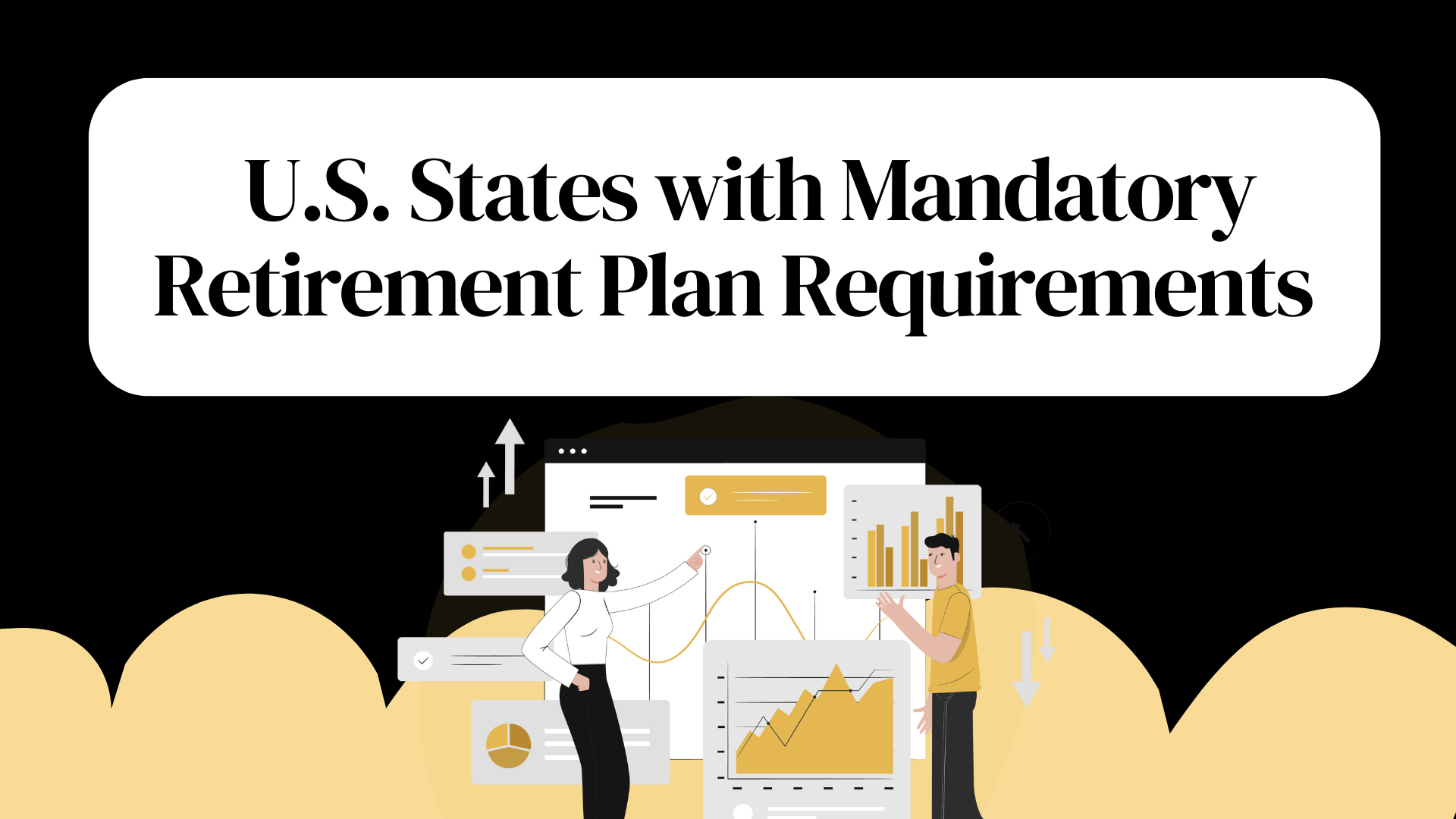As of 2025, a number of U.S. states have enacted legislation requiring certain private-sector employers to offer retirement savings options to their employees, typically through state-sponsored programs or qualifying private plans. These mandates primarily target employers who do not already provide retirement plans, aiming to bridge the retirement savings gap among workers. At federal level, the SECURE 2.0 Act also introduces a range of provisions designed to expand retirement plan access and participation, further reinforcing the importance of employer-sponsored savings initiatives.
If you have or plan to hire in certain U.S. states, you’d need to be aware of mandated retirement plans, so you don’t miss deadlines and put yourself at risk.
What’s a state-mandate retirement plan?
A state-mandated retirement plan is a government-initiated program that requires certain private-sector employers to offer a retirement savings option to their employees—typically through a Roth IRA facilitated by the state. These programs are designed to help close the retirement savings gap, particularly for workers at small and mid-sized businesses who may not otherwise have access to an employer-sponsored retirement plan. While employers are not required to contribute to these plans, they are responsible for enrolling eligible employees and facilitating payroll deductions. Businesses that already offer a qualified retirement plan, such as a 401(k), are generally exempt from participating.
States with active mandates:
California
California mandates retirement savings for most private sector employers. The state’s program, CalSavers, requires employers with 5 + employees (deadline for 1-4 employees is December 31, 2025) to either participate in CalSavers or offer a qualified retirement plan alternative.
If employers fail to comply, there is a penalty of $250 per eligible employee for initial non-compliance.
Colorado
Colorado SecureSavings Program mandates that employers with 5 + employees who have been in business for at least two years offer a retirement savings plan. The penalty for non-compliance is $100 per affected employee, up to $5,000 annually.
Connecticut
Employers in Connecticut who have 5 or more employees that each earn more than $5,000 in a calendar year must either participate in MyCTSavings. Penalties may be imposed; legislation is currently under consideration.
Delaware
Through its Delaware Expanding Access for Retirement and Necessary Savings (EARNS) program. Employers with five or more employees who have been in business in Delaware for at least six months are required to either provide a qualified employer-sponsored retirement plan or enroll their employees in the state-sponsored EARNS program
Illinois
Illinois Secure Choice requires employers with 5+ employees who have been in business for at least two years. The penalty for non-compliance is $250 per employee for the first year
Maine
Maine has its Maine Retirement Savings Program. It is mandatory for employers with 5+ employees. Penalties will apply from July 1, 2025, onwards starting at $20 per employee, increasing in subsequent years.
Maryland
Mandatory for employers with at least one employee – MarylandSaves.
Massachusetts – CORE Plan
Massachusetts has both a mandatory and voluntary retirement plans.
The Massachusetts State Employees’ Retirement System is a defined benefit plan mandatory for most state employees. Membership is mandatory for nearly all state employees who are regularly employed on a part-time (minimum half-time) or full-time permanent basis.
The Voluntary State-Sponsored Retirement Plan – CORE Plan, is designed specifically for the state’s nonprofit sector.
New Jersey
New Jersey mandates that most private sector employers offer a retirement savings plan to their employees. Specifically, employers with 25+ employees who have been in business for at least two years and do not already offer a qualified retirement plan must register with the RetireReady NJ program
Oregon
OregonSaves is a state-mandated retirement plan, meaning that certain employers must either enroll their employees in the program or sponsor a qualifying plan of their own through the private market. Penalties of $100 per affected employee, up to $5,000 annually apply.
Virginia
In Virginia Retire Path offers a retirement savings program for private sector employees, designed to help those who don’t have employer-sponsored retirement plans. It is mandatory for employers with 25+ employees who have been in business for at least two years.
Vermont
Vermont has a state-mandated retirement plan called Vermont Saves. It requires employers with five or more employees to either offer a qualified retirement plan or enrol their employees in VT Saves.
States with Upcoming Mandates:
- Minnesota – expected to launch Minnesota Secure Choice Retirement Program by January 1, 2026.
- Missouri – expected to be operation on or before September 1, 2025.
- Nevada – the program is expected to be operational by July 1st and is applicable for employers with more than 5 employees.
- Rhode Island – mandatory for employers with 5+ employees; launching spring 2025. (RISavers)
- Washington (Washington Saves) – mandatory for employers without a retirement plan; expected to launch January 1, 2027.
Employer Considerations
- Eligibility: Employers are typically required to participate if they do not offer a qualified retirement plan and meet specific employee count thresholds.
- Compliance: Non-compliance can result in financial penalties, which vary by state.
- Alternatives: Employers may opt to offer their own qualified retirement plans, such as 401(k)s, to satisfy state requirements.
State-mandated retirement plans are part of a broader initiative to enhance retirement savings among workers, particularly those employed by small to mid-sized businesses.
When placing talent or managing clients across multiple states, recruitment firms need to ensure that the businesses they serve comply with state regulations. Failing to enroll eligible workers or meet deadlines can result in fines and legal issues for clients, which may reflect poorly on the recruiter or firm involved.
Moreover, retirement benefits are increasingly seen as a core part of total compensation. Candidates can be more likely to be drawn to roles that include access to retirement plans, especially in states where participation is automatic. Recruitment firms that understand and communicate these benefits effectively can enhance their value proposition to both clients and candidates
To keep on top of the latest employment regulation changes, partner up with an EOR.



